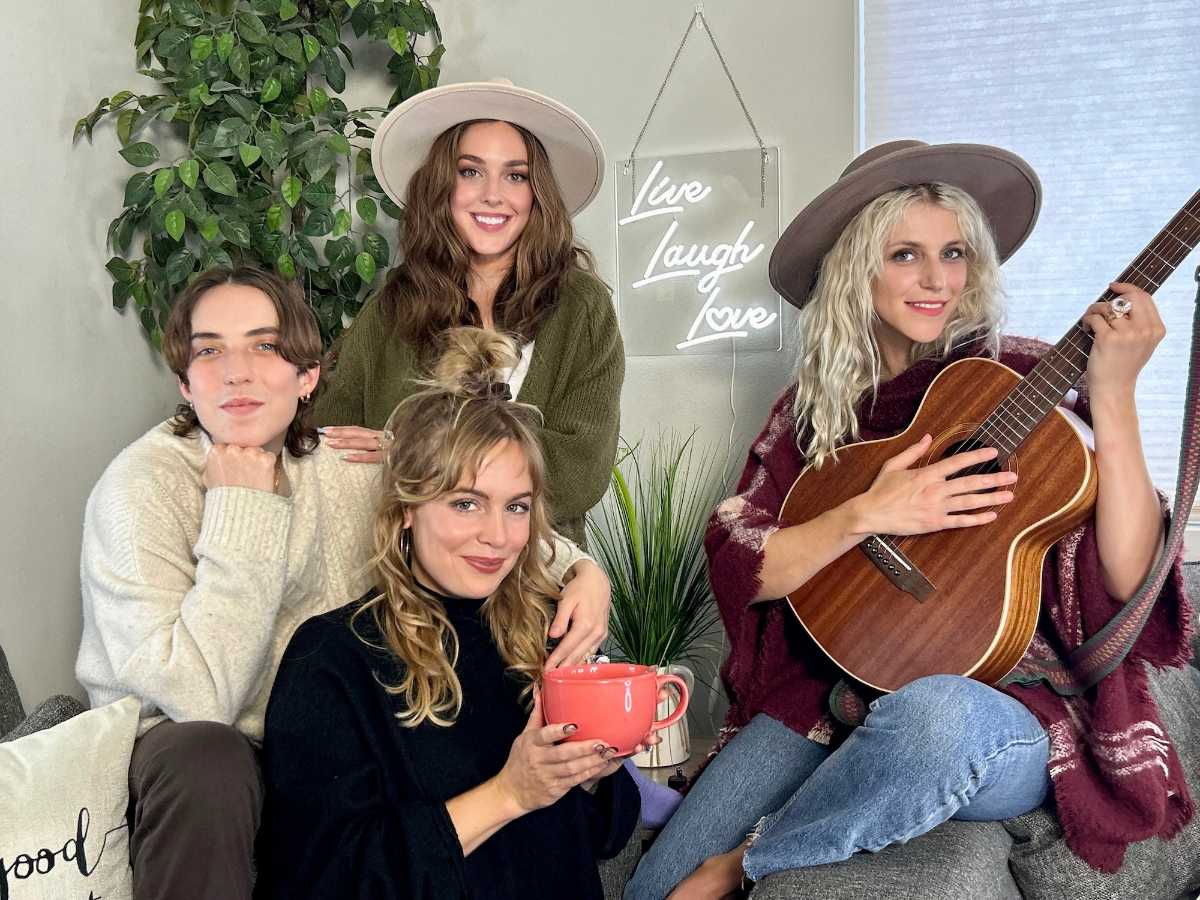Chastity Belt
Charlotte Cornfield

CHASTITY BELT
Live Laugh Love.
It’s a phrase you might encounter in a certain type of cursive on the wall of a certain type of home. On the opposite end of the mood board, it’s also a stick-and-poke tattoo on Chastity Belt guitarist/vocalist Julia Shapiro’s left ankle (just below a highly improvised Shrek), and the title of the band’s fifth album. It’s fun, it’s funny, but it’s also sincere, not unlike the band’s history—a joke that became real because it was always real—and the enduring bond that has been their band’s foundation for the past 13 years.
In their decade-plus together, the four-piece—Shapiro (she/her), Lydia Lund (guitar, vocals – she/her), Gretchen Grimm (drums, vocals – she/her), and Annie Truscott (bass, vocals – they/them)—have created a resonant body of work. The early days of “Nip Slip” and “Pussy Weed Beer” (hits from their iconic debut full-length No Regerts, which recently celebrated 10 years) and the “Cool Slut” era of 2015’s Time To Go Home were raucous bonanzas of dry wit and self-evident feminism. A newfound gravity on 2017’s I Used to Spend So Much Time Alone shifted the lyrical mood toward introspection as they continued to refine their trademark sound: lush intertwining guitars, meticulous rhythms, a careful balance of melancholy and optimism. Two years later, the dreamy Chastity Belt marked a renewal of vows to their musicianship and friendship, each member coming into their own as artists, convening with a fresh perspective on collaboration.
Live Laugh Love is a natural continuation. Against the bizarre backdrop of the past few years, Chastity Belt remained a supportive space for the members to grow and experiment, drawing on the ingredients most essential to their process since the beginning: authenticity and levity. Recorded over three sessions in as many years (January 2020, November 2021 and 2022), the focus became more about enjoying their time together in the studio than making it feel like work. Their ease and familiarity with engineer Samur Khouja in LA, who also recorded their last album, made for a particularly enjoyable process, even using extra time to work out a couple joke songs to entertain only themselves (fingers crossed we hear their medieval jig, “Shilling for the Shire,” on a bonus edition someday). Once completed, they returned to renowned engineer Heba Kadry (Bjork, Slowdive) who mastered the album.
Album opener “Hollow” sets the tone with a gently driving rhythm while guitar layers stream like sun rays through an open car window. A warmth radiates through Shapiro’s voice, even while grappling with feeling lost and stuck. “The older I get,” Shapiro says of the lyrics, “the more I realize that I might just always feel this way, and it’s more about sitting with the feeling and accepting it, rather than trying to fight it.” That wisdom seems to anchor Live Laugh Love. Chastity Belt has never shied from navigating the spectrum of difficult emotions, and an existential thread weaves throughout the subject matter. And yet the songs feel more grounded than ever; there’s a sense of quiet confidence and self-assurance that comes with being less numb and more present. Facing discomfort takes more fortitude, after all.
Live Laugh Love finds the members in their prime as musicians. Their parts trace intricate patterns over one another, but there’s room to breathe between the layers. Everyone contributes to the writing, sometimes switching instruments, and for the first time, all four members sing a song. It’s never been more apparent that they are creative siblings, cut from the same belt. “We’ve been playing music with each other for over a decade,” says Shapiro, “so it really does feel like we’re all fluent in the same language, and a lot of it just happens naturally.”
“Laugh” seeks in the balm of friendship, aware of the anticipatory nostalgia that hits during a good time that you’re already missing before it’s gone; the heavier guitar tones on “Chemtrails” streak ominous chord progressions over Grimm’s precision timekeeping, lamenting memories that won’t fade easily. During a transitional time, Truscott came across a note in their phone that read, “it’s not hard all day, just sometimes,” which inspired a poignant line in the chorus of “Kool-Aid,” their first song as lead vocalist on a Chastity Belt recording. Another standout, “I-90 Bridge” shines with a silvery melody that soars as Lund belts one of the most resounding moments on the album: “Tell your girlfriend she’s got nothing to fear/I’m set in my head/My body’s a different story.” The track “Blue” saunters nonchalantly with a wink; you can almost hear Shapiro’s smile as she sings “Faking it big time/So I can hit my stride/Man, it feels good to be alive,” channeling early Chastity Belt channeling early ’90s before channeling the late Elliott Smith in a spiral of distortion and insight: “Don’t get upset about it/It’s gonna pass/Tell all your friends about it/They’re gonna laugh.”
“We have such a strong sense of each other’s musical inclinations” says Lund. “I think this allows for a lot of playfulness…we can kinda surprise each other, like a good punchline would.”
Living, laughing, loving… maybe it really is that simple.
CHARLOTTE CORNFIELD
It’s been less than two years since Highs in the Minuses became Charlotte Cornfield’s break-out—a magnetic mission-statement for the Toronto songwriter described by Rolling Stone as “Canada’s best-kept secret.” Cornfield emerged from pandemic seclusion with new fans, raised expectations, and her first major US tour. She could have kept touring forever; she could have fled to the woods with a four-track. She could have done anything. What she did was jump into an old Subaru, driving seven hours south to the Hudson Valley. The car didn’t have any A/C; she had only recently earned her license; and she had never met the producer she was driving down to meet. But when Cornfield arrived in Hurley, NY, at the red-steepled church that is now Dreamland Recording Studios, she was ready for whatever came next. “There was this letting go of some of the strongheaded-ness that I think I used to have,” she says, “and an embracing of the open-endedness of life.”
Cornfield had come to Hurley to work with producer Josh Kaufman, thrilled by his sublime recordings with Cassandra Jenkins, Anais Mitchell and his own band, Bonny Light Horseman. The album they’d now make together, Could Have Done Anything, is a testament to Cornfield’s uncommon life and all its possibilities, an acknowledgment that the best musicians can turn fleeting moments into timeless songs. Over nine magnetic tracks, the singer-songwriter begins yet another chapter: gazing in the rear-view to understand where she’s been; squinting through the sunset to see what’s ahead. Calmer than I was, she sings in the album’s final moments. Stronger than I was / older than I was / less angry than I was…—and finally—happier than I was / happier than I was / happier than I was…
Whereas Cornfield’s preceding albums were made in familiar settings, with troupes of friends, her latest long-player reaches into the unknown. Kaufman and Cornfield (who went to school for jazz drums) played every instrument themselves, from ringing guitars to cozy piano, Hammond B3, pedal steel and synthesizers. Together with engineer D. James Goodwin (Kevin Morby, Whitney) and assistant engineer Gillian Pelkonen, the pair worked swiftly, impulsively, trying to shrink the gap between having an idea and putting it on tape. The resulting sound is at once elaborate and unrehearsed; there’s a sense that it’s coming together—and coming alive—at the very moment it’s being made.
“The hours flew by,” Cornfield says. “We lived inside of the songs there, for a few days.” You can hear it on a tune like “Cut and Dry,” where a radiant, easygoing groove forms the landscape of a song about seeing people as a whole, together with their mistakes. There’s a similar throughline to “In From The Rain,” where rambling 70s licks and Cornfield’s tambourine flutter trace the evolution of a friendship, from intimacy to disappointment to acceptance. On the latter, listen at the end of the first minute, after Cornfield sings a lyric about rainstorms and visitors: Suddenly you were there, goes the line—as a real-life thunderclap unfurls, like an angel’s drumroll. “All the mics picked it up,” she recalls. “So we left it in.”
“Gentle Like the Drugs” draws on imagery from a spring tour in the American west. “I was experiencing joy on the road in a way I really hadn’t before,” Cornfield says, and you can hear it in the patient pleasure of these chords, or the way she narrates her first impressions of Arizona: I watch the colours get real / the pink and the teal / I see a dust devil / I see an elevator. Like riding across the desert with your friends; like smoking a joint at the end of a long day; but the song’s alternating verses orient themselves towards another sensation, too: that feeling of being home, and happy, when your lover’s not around. Not because they’re gone, but because you know they will return.
Intimacy and absence go hand-in-hand on Could Have Done Anything: the theme repeats on the unfussy love-song “You and Me,” with its tale of tour and homecoming. You’re sunkissed in your Subaru / Picking me up at Terminal 3, she sings—and, later, two bikes on a pavement path / ice cream cones and epitaphs. Some love is as simple as this: liberating, easy, like piano and guitar in two-step. “I’ve been trying to write a song like this for a long time,” Cornfield says. “A catchy love-song, with cars. Where it feels like the narrator could go anywhere and do anything.
That was the spirit of this record: connection, possibility, acceptance. “Don’t be afraid to take a left,” Kaufman would say, encouraging Cornfield to drop preconceptions, invent new rules. Even with the small things, like wandering around the tracking room with a pair of claves in your hands, or adding random, surround-sound echoes to “The Magnetic Fields”—a song about a potent and formative live concert experience. Throughout, Cornfield tried to channel the energy of her favorite classic records, from Tapestry to Blood On The Tracks to Car Wheels On A Gravel Road—albums where the listener is simply carried by the songs and the playing.
After six days, Cornfield went back to Canada, with a new album to mix and master. Another day-long drive; another homecoming; and one more thing, too, which would arise a little over nine months later: the singer’s first baby’s due April 2023. Anything can happen.

